What’s in Your Shed? visits a Herefordshire contractor
In the latest from our series that takes a peek behind the doors of the nation’s machinery sheds we visit Herefordshire contractors WE Price, which offers a range of services including forage harvesting, combining and spraying.
The company started in 1966 with a Nuffield 1060, plough and baler, but has expanded over the years and now runs seven tractors along with a fleet of cultivations and grass machinery.
How did you get started?
Our dad, Willy, started back in 1966 with a Nuffield 1060, a plough and a baler. He gradually grew the business and we both joined him after we left college.
We are still a fairly small team consisting of the two of us, Jason Merriman and Dom Finlay. Dad is still very active and we have a few casual workers at busy times, too.
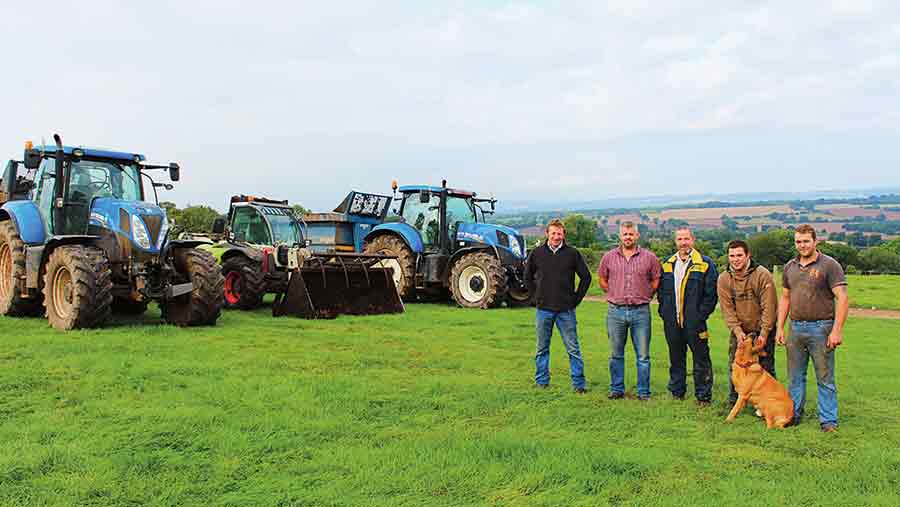
The WH Price contracting team © James Andrews
See also: What’s in Your Shed visits a Minneapolis mixed farm
How loyal are you to individual brands?
On the tractor front we have been pretty loyal to New Holland over the years.
The only other brand we have dabbled with is Case, as we were really impressed with the MX range that came out in the mid 1990s.
Business facts
WE Price, Shortlands Farm, Leysters, Herefordshire
- Drilling 10,000ha
- Grass silage 400ha
- Maize silage 180ha, 40ha of which is for an AD plant.
- Combining 730ha
- Muckspreading 15,000t of FYM and poultry muck
- Baling 7,500 big square and 4,500 round straw bales, 3,500 wrapped round silage bales
- Stubble-to-stubble contracting 200ha
- Staff Two full-time plus three or four casual workers at busy times
We had two MX135s and an MX150, all of which were great tractors. We still have an MXM130 that we got a bit later, which has also been fantastic.
We have also stuck with John Deere combines and we’ve been pleased with the output of our two CTS machines. They run rings around our WTS walker version and the straw quality is similar.
Favourite dealer?
All our Claas kit comes from Morris Corfield. It is a fantastic firm to deal with – nothing is ever too much trouble.
Our local New Holland dealer Ravenhill and John Deere dealer Tallis Amos are also really good.
Favourite machine?
We just bought a Househam Air Ride 3000 to replace our old Sprint and the difference is amazing. One of the most noticeable things is the quality of the ride, which is so much smoother.
The 230hp Iveco engine also has a good bit more power and purrs up the banks.
The rate controller is really accurate, too, and we are planning to fit auto-section control to improve it further. Upping our tank capacity from 2,000 litres to 3,000 litres also means we can cover quite a bit more ground in a day.
It’s a 2009 model on 4,500 hours and we bought it from a local spraying contractor who had looked after it really well.
Least favourite machine?
The old Amazone 4m combination drill we had before the Lemken Solitair. The drill itself wasn’t too bad, but the power harrow’s gearbox broke up and we had to replace several bearings in the bed too.
In the shed
- Tractors New Holland T7.270, T7.200 x 2, 7050, 7030, 6080; Case-IH MXM130
- Forager Claas Jaguar 870 with grass pickup and eight-row Kemper maize header
- Sprayer Househam Air Ride 3000 with 24m booms
- Combines John Deere CTS 9780 x 2 and WTS 9640
- Drills 4m folding Lemken Solitair 9, 4m Vaderstad Rapid, 3m Amazone ADP303, Kverneland/Accord Optima six-row maize drill x 2
- Cultivation kit Five-furrow Kuhn Varimaster plough, seven-leg McConnel Discaerator, 5m Vaderstad Carrier, 4m Kuhn folding power harrow
- Grass kit Claas Disco front-and-rear mowers, Volto 770 tedder and 2800 twin-rotor rake
- Telehandler Claas Scorpion 7040 and Matbro Teleram TR250
- Muckspreaders Bunning Lowlander x 3
- Balers New Holland BR7060 round baler and Claas Quadrant 2200.
As it was a rigid drill, we also got pretty fed up with having to keep taking it off whenever we went down the road.
Oldest machine still at work?
All of our round bale wrapping is done with a 20-year-old Kverneland 7517 that has done tens of thousands of bales.
We bought it six years ago for £1,200 to do a bit of work on our own farm and it’s ended up doing everything.
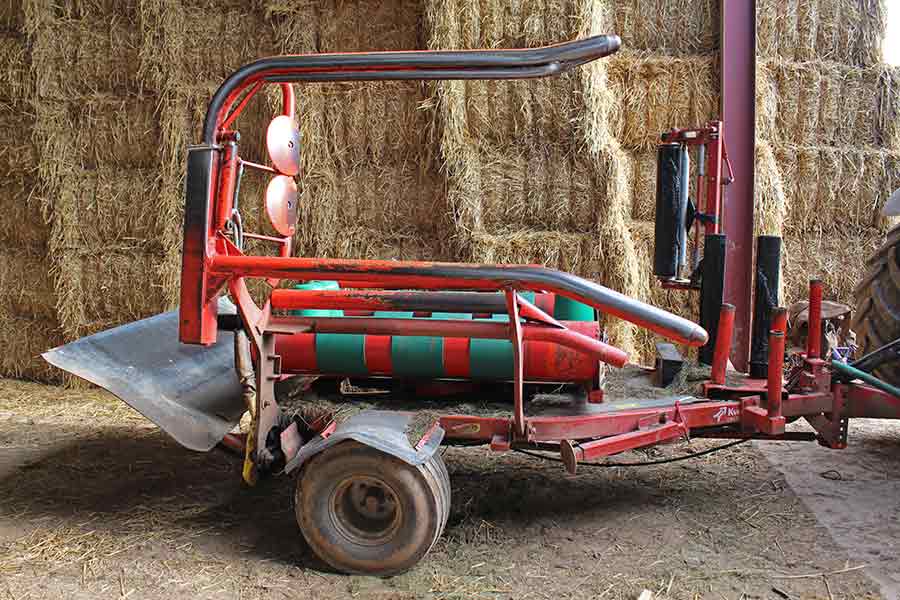
Kverneland balewrapper © James Andrews
The beauty of it is that it’s so simple and easy to repair. The hydraulic motor went just after we had it and we have replaced the ring gears, but it hasn’t given any other trouble.
How long do you keep your machines?
Tractors are roughly on a five-year replacement policy. We always like to have three or four frontline tractors on less than 5,000 hours, but the others will usually go a bit higher as they are clocking up about 1,200 hours/year.
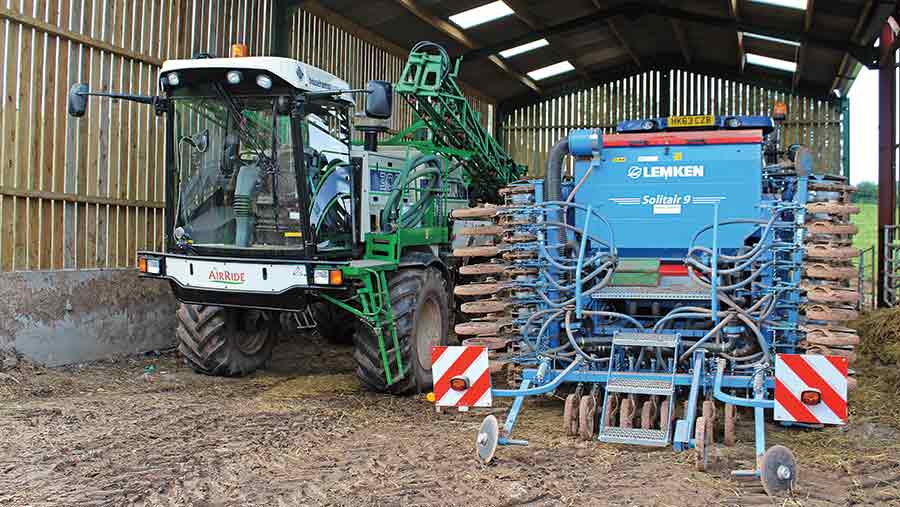
Lemken Solitair drill © James Andrews
We always buy second-hand or ex-demonstrator tractors with about 1,000 hours on the clock, as they have already depreciated quite a bit.
Combines and a lot of the grass kit is on a three-year replacement policy. We always buy grass equipment new, but we usually look for tidy combines with about 1,000 hours on the clock.
What’s next on your wishlist?
We quite fancy a second-hand Simba Solo or Vaderstad Topdown, as we would like something that works the ground a bit more than the Discaerator. You can pick them up for about £15,000 at the moment, which we don’t think is bad value.
A 3m version would also be fairly well matched to the T7.270, particularly if you flick the pto into gear to engage boost – not the done thing, but it works.
If we had some spare cash it would also be nice to get a matching fleet of trailers.
Most embarrassing machinery mistake?
The first time we went drilling with our Amazone 3m combination we didn’t set the spring tension on the metering wheel correctly. As a result it kept bouncing in and out of work, creating a lovely chequerboard pattern across the field.
Luckily they were only small patches and as the crop tillered out they filled in fairly well.
Most expensive repair bill?
That would be the £8,000 bill we had for putting a new transmission in the Claas Scorpion. Thankfully we didn’t end up paying the full price.
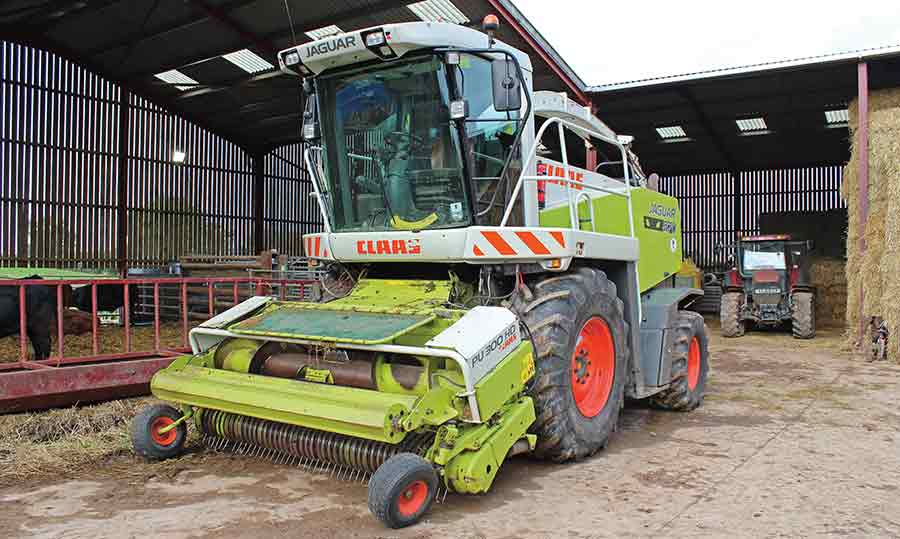
Claas Jaguar 879 forager © James Andrews
Best invention?
We’re not big inventors, but we do a lot of repairs and modifications to our machinery.
What couldn’t you live without in the workshop?
The welder and the hammer.
Do you ever buy new?
Most implements that get a hard life we’ll buy new. That includes mowers, tedders, rakes, power harrows and muck spreaders.
Favourite/least favourite job?
Andrew: Drilling is the most satisfying job for me and I particularly hate the job of cutting string off the muckspreader rotors.
Steve: Probably spraying followed by combining with one of the CTSs. Hedgecutting is my least favourite.
Everyday transport?
Steve: I have a 2003 Jeep Cherokee that I bought at a farm sale for £1,000. It’s done 140,000 miles and hasn’t given much trouble. It’s also pretty comfortable.
Andrew: Mine’s a 2003 Mitsubishi L200 that’s also been fairly reliable. It’s a heavy fuel user, though.
Best tractor you’ve every had?
That has to be the Case MXM130. It is a 2003 model and in its early days it was the main drilling tractor. Now it has clocked up more than 12,000 hours and has been semi-retired to wrapping duties and other odd jobs. It has been a real gem and hasn’t given a jot of trouble.
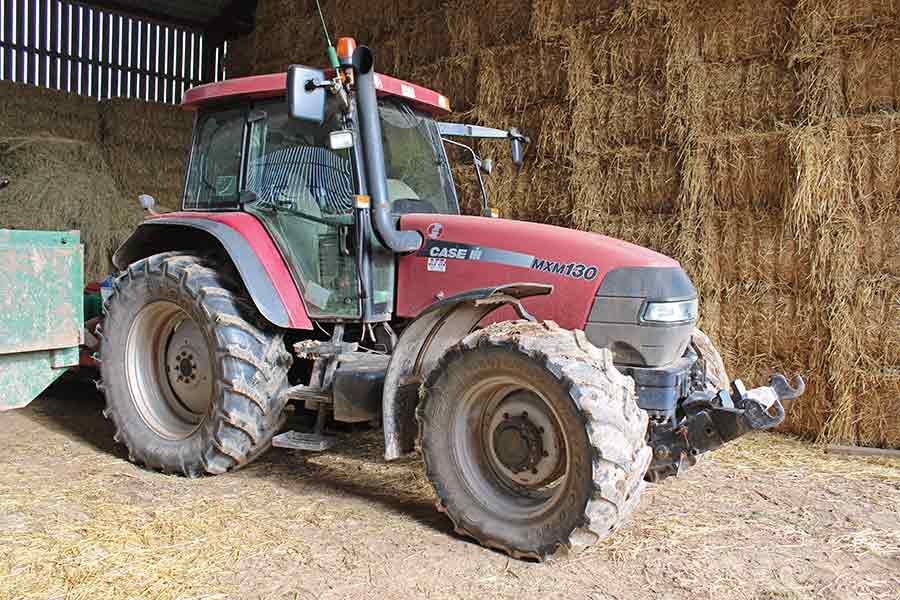
Case-IH MXM130 tractor © James Andrews
Worst tractor you’ve ever had?
We had a Case/Steyr CS150 that was a complete pig. The main problem was that the half shafts used to snap like carrots and would barely last 400 hours.
It had only done 900 hours when we bought it, but we moved it on after it had been with us for less than a year.
Biggest bargain?
We have had some pretty good deals, but I’m not sure we would call them a bargain. One of the best was a 14t Henton trailer that we bought for £4,000 about 10 years ago.
It has been great, is still really tidy and we would probably get our money back if we sold it.
Biggest machinery myth?
Tractors with large amounts of boost – they’re nowhere near as powerful as they look.
Any machinery toys or classics in the shed?
Unfortunately not. We have had some great ones over the years, but we have always traded them in for something newer. There are a couple we wish we had held on to.
Are you a What’s in Your Shed fan?
If you’re a regular reader of What’s In Your Shed?, why not get in touch and be featured yourself? For the series to work we rely on farmers and contractors coming forward and inviting us to look round their machinery sheds.
So if you have considered taking part, but haven’t got round to approaching us, please get in touch. And if you think your farm is too small, or your machinery is too old, think again – we want to visit farms of all shapes and sizes. It just needs to be a proper, working farm or contracting business.
You can get in touch by sending an email to fwmachinery@rbi.co.uk or by calling 020 8652 4951.

